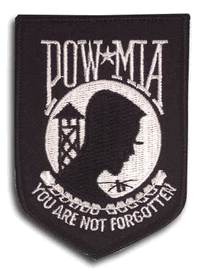|
National POW/MIA Recognition Day

The United States’ National
POW/MIA Recognition Day is observed across the nation
on the third Friday of September each year. Many Americans
take the time to remember those who were prisoners of war
(POW) and those who are missing in action (MIA), as well as
their families.
National POW/MIA Recognition Day is not a federal public
holiday in the United States but it is a national
observance.
All military installations fly the POW/MIA flag, which
symbolizes the nation’s remembrance of those who were/are
imprisoned while serving in conflicts and those who remain
missing. Veteran rallies take place in many states on
National POW/MIA Recognition Day. United States flags and
POW/MIA flags are flown on this day and joint prayers are
made for POWs and those missing in action. National POW/MIA
Recognition Day posters are also displayed at college or
university campuses and public buildings to promote the day.
Remembrance ceremonies and other events to observe the day
are also held in places such as the Pentagon, war memorials
and museums.
The United States Congress passed a resolution authorizing National
POW/MIA Recognition Day to be observed on July 18, 1979. It was
observed on the same date in 1980 and was held on July 17 in 1981
and 1982. It was then observed on April 9 in 1983 and July 20 in
1984. The event was observed on July 19 in 1985, and then from 1986
onwards the date moved to the third Friday of September. The United
States president each year proclaims National POW/MIA Recognition
Day. Many states in the USA also proclaim POW/MIA Recognition Day
together with the national effort.
Click
here for more on National POW/MIA Recognition Day.
Newt Heisley
designed the POW/MIA flag. The flag’s design features a
silhouette of a young man, which is based on Mr. Heisley’s son, who
was medically discharged from the military. As Mr. Heisley looked at
his returning son’s gaunt features, he imagined what life was for
those behind barbed wire fences on foreign shores. He then sketched
the profile of his son as the new flag's design was created in his
mind.
The flag features a white disk bearing in black
silhouette a man’s bust, a watch tower with a guard on patrol, and a
strand of barbed wire. White letters “POW” and “MIA”, with a white
five-pointed star in between, are typed above the disk. Below the
disk is a black and white wreath above the motto “You Are Not
Forgotten” written in white, capital letters.
The flag can also be displayed on
Armed Forces Day,
Memorial Day,
Flag Day,
Independence Day
and
Veterans Day.
The flag can be displayed at the Capitol, the White House, the
Korean War Veterans Memorial and the Vietnam Veterans Memorial,
national cemeteries, various government buildings, and major
military installations.
Click
here for
more on the history of the POW/MIA flag (Link
courtesy of Neal Schwartz). |



